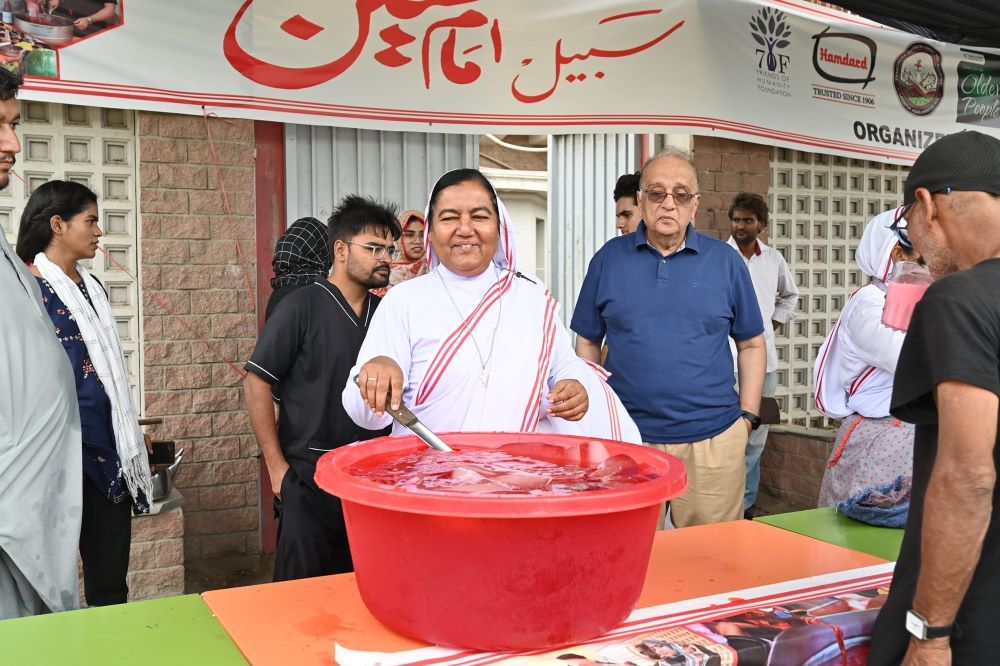
Franciscan Missionary of Christ the King Sr. Fazilat Inayat prepares sharbet on July 12 outside Dar-ul-Sukun Centre in Karachi, Pakistan. The congregation distributed the drink as Muslims of the Dawoodi Bohra community observed Ashara Munaraka. (Courtesy of Kashif Anthony)
As attacks on religious minorities reached record heights last year in Pakistan, the only Indigenous Roman Catholic religious order in the southern port city of Karachi offered cold water and juice to Muslims in the holy month of Muharram.
At St. Patrick's Cathedral in Karachi, the Franciscan Missionaries of Christ the King fostered interfaith relationships by organizing free sabeels (traditional stalls providing refreshments) in July for Muslims commemorating the seventh-century killing of Muhammad's grandson. The observance is known as Ashara Mubaraka, or the Blessed Ten: a period of 10 days at the start of the Islamic new year in which the Dawoodi Bohra community (a Shia Muslim denomination) fasts and holds spiritual gatherings to mourn the martyrdom of Prophet Muhammad's grandson Imam Husayn and his companions at the Battle of Karbala in Iraq.
Beginning July 8 at a mosque near the cathedral, three such events were hosted for Dawoodi Bohra and Muslim pedestrians, as well as residents of Dar-ul-Sukun (Home of Peace) Centre for seniors, which the sisters manage.
According to Kashif Anthony, the diocesan coordinator of the Commission for Interreligious Dialogue and Ecumenism, the Franciscan Missionaries of Christ the King were chosen for the event because of their prominence within the Muslim community. The vast majority of those who benefit from the sisters' educational and social work are Muslim.

Franciscan Missionaries of Christ the King mark Ashura, which falls on the10th day of the holy month of Muharram in the Islamic calendar, on social media. (Courtesy of Kashif Anthony)
Clad in her community's signature white sari with a border of three red stripes, 52-year-old Sr. Fazilat Inayat spent two hours distributing more than 300 liters (79 gallons) of chilled sharbet (a fruity beverage) to the Muharram mourners, breaking their long day fast during the scorching summer heat.
"We are born and educated among Muslims. Close cordial relations are the need of time. Charity work and serving humanity sent a strong message of brotherhood solidarity; we are one," Inayat said. "We have to live together with majority Muslims like a family. It was an effort to support them in their holy days."
According to organizers, the sabeels aimed at quenching the thirst of more than 80,000 fasting Dawoodi Bohras from Pakistan and around the world observing Ashara Mubaraka in Karachi. The sisters provided a traditional feast and beverages for all, regardless of age or background, they said.
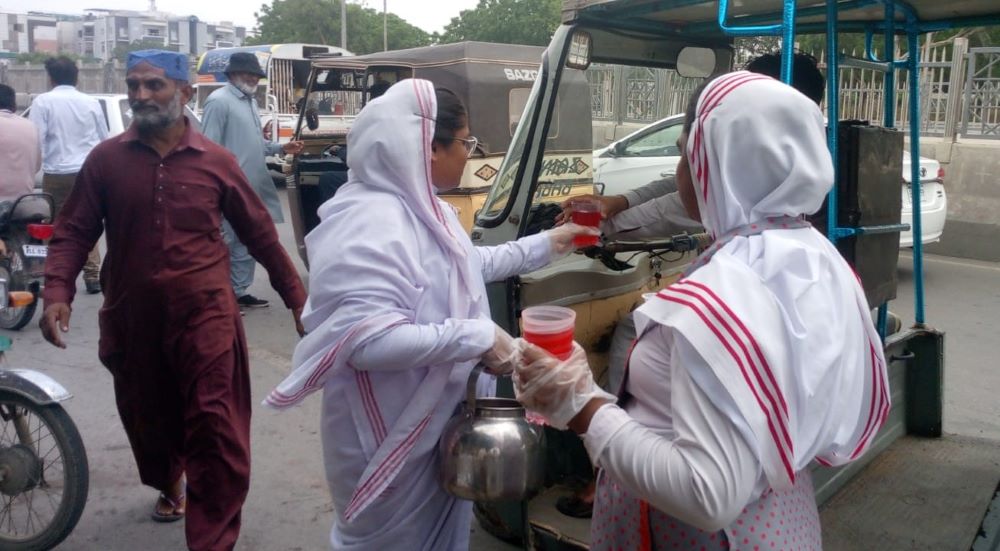
Franciscan Missionaries of Christ the King distribute cool drinks on July 12 outside Dar-ul-Sukun Centre in Karachi, Pakistan, as Muslims of the Dawoodi Bohra community observed Ashara Munaraka. (Courtesy of Kashif Anthony)
"The event was a wonderful opportunity for connection and community building, and we were thrilled to see people from all walks of life enjoying the refreshing drinks and quenching their thirst on a hot humid day," the Franciscan Missionaries of Christ the King said, highlighting the event on their official YouTube channel. "Our team worked tirelessly to ensure the event's success, and we are grateful for their dedication."
In return, the Bohra community contributes to the safety and security of the Catholic community during Easter and Christmas, when the cathedral hosts midnight services that attract large crowds. At least 20 Bohra youth volunteer as security guards to ensure safety during these prayers.
Sunni Islam is Pakistan's official state religion. Muslims make up 95% of the country's 240 million people; Sunnis are the majority, at 80%. Christians make up less than 2% of the population.
Attacks in Pakistan have increased since the Taliban regained control of neighboring Afghanistan in August 2021. According to the Pakistan Institute for Conflict and Security Studies, 329 people were killed in 29 suicide assaults last year, the most since 2014.
In the first six months of this year, over 70 incidents affected more than 140 Christian families, according to the human rights group Dignity First. In May 2023, two school girls were killed and five others injured when a police constable opened fire at Sangota Public School, managed by the Sisters of the Presentation of the Blessed Virgin in Pakistan's restive Swat Valley, in the northwestern Khyber Pakhtunkhwa province.
Ministering since 1937
Serving in Pakistan since 1937, the Franciscan Missionaries of Christ the King are also engaged in educational, pastoral, health and social work.
They presently provide care and shelter to 120 residents at Dar-ul-Sukun seniors; home and 325 children at Dar-ul-Sukun home for underprivileged people with disabilities, where sisters eagerly accept children left on their front steps. Eighty five percent of these beneficiaries are Muslims, said Inayat, general secretary of Dar-ul-Sukun Welfare Society.
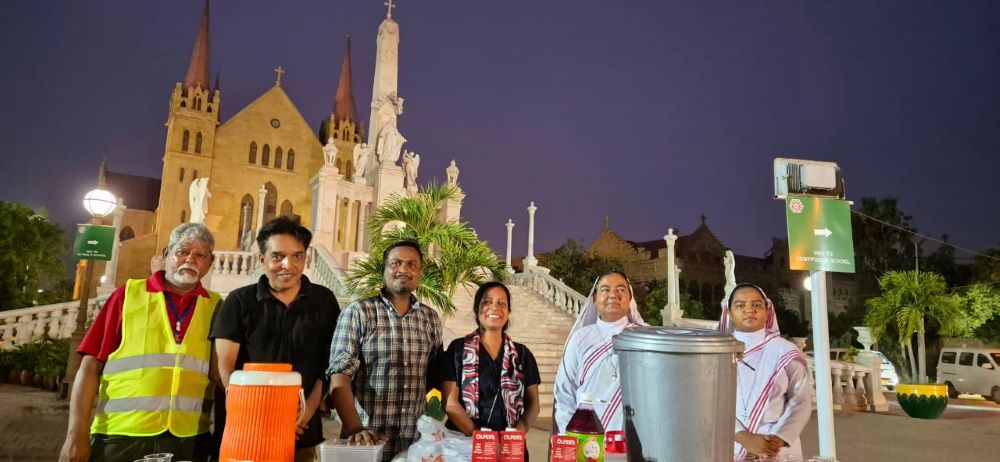
Franciscan Missionaries of Christ the King and Catholic volunteers work at a sabeel stand at St. Patrick's Cathedral in Karachi, Pakistan, on July 16. Muslim volunteers provide security at the cathedral during Easter and Christmas services. (Courtesy of Kashif Anthony)
All these facilities are located in the southern archdiocese of Karachi, the country's largest city. More than 300 are cared for at another home for the disabled in Tando Allahyar in Sindh province.
But while most of the sisters' homes are for Muslims, at Lemmens House — which provides shelter and education for girls from broken families — all 50 residents are Christians.
"We also get requests for Muslim orphan girls who have no shelter, but we avoid them due to the highly sensitive issue of blasphemy," said Sr. Venus Bachan, who is in charge of Lemmens House. "It is a huge problem."
If Muslim orphan girls are sheltered with Christians at the Lemmens House, in the event of a fight, the Muslims can accuse the Christian girls of blasphemy, a crime that results in death and life sentences in Pakistan. (Human rights activists say the controversial blasphemy law in the Muslim majority country is often used against religious minorities to settle personal scores.)
"They prefer the safety of our homes over another foundation that runs the world's largest network of ambulances and shelters for the homeless," Bachan said.
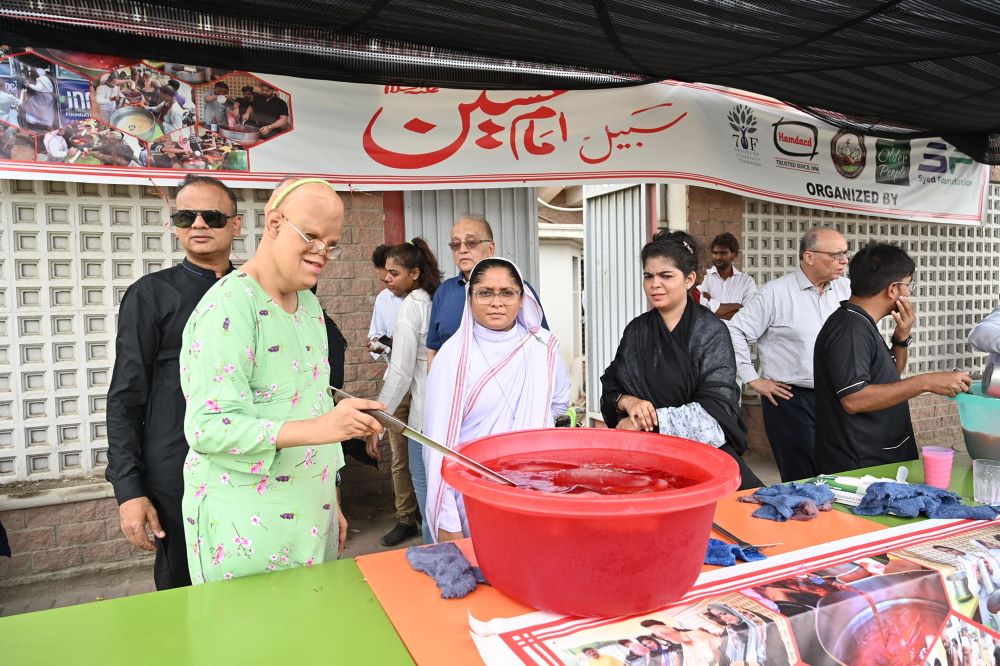
Cookie Lewis (in green dress), a special needs teacher and public relations officer at Dar-ul-Sukun helped members of the Franciscan Missionaries of Christ the King prepare sharbet July 12 at a stall outside the center in Karachi, Pakistan. (Courtesy of Kashif Anthony)
Lemmens House is named after Sr. Gertrude Lemmens, the Dutch founder of Dar-ul-Sukun, also known as the "Mother Teresa of Pakistan" and the "Angel of Karachi." In 1989, Lemmens received the Sitara-i-Quaid-i-Azam (Star of the Great Leader), one of the highest honors given to foreign nationals, from the president of Pakistan.
On July 20, the congregation observed the fourth anniversary of the death of Sr. Ruth Lewis, nicknamed "Mother of Pakistan's Forgotten Ones," who co-founded the Dar-ul-Sukun home in 1969 with Lemmens. The municipal and provincial governments had given her numerous prizes including Sitara-e-Imtiaz for her 50 years of serving people with disabilities in Karachi. She was also the recipient of two other notable regional awards, the Pride of Karachi award in 2014 and Hakeem Muhammad Saeed award in 2018.
Advertisement
"People know about the contribution of FMCK nuns due to these community development initiatives," Anthony said. "Their exposure has resulted in cordial relations with Muslim celebrities, politicians and NGO workers who often visit their centers."
"There is more interest when both male and female church leadership, in their signature attire, come at the forefront of inter-religious events," he continued. "Such gender equality is absent in interfaith programs organized by Muslims."
Their reputation has helped the nuns in running zakat (Islamic tithes) donation drives and certificates of approval from clerics on the Dar-ul-Sukun Shariah Board during Ramadan, the Islamic holy month of fasting.
"Christians are not entitled to zakat funds that come from the obligatory taxes required of Muslims," Anthony said, adding that that money collected is "allocated to welfare activities and support programs aimed at assisting the needy Muslims as per Shariah law.
"Dar-ul-Sukun is one of the few Catholic institutes getting this charity otherwise restricted by religious guidelines," he said.
"Their special homes not only strengthen interfaith bonds but also set a powerful example of how acts of kindness and charity can bridge divides and foster a more inclusive and supportive society."
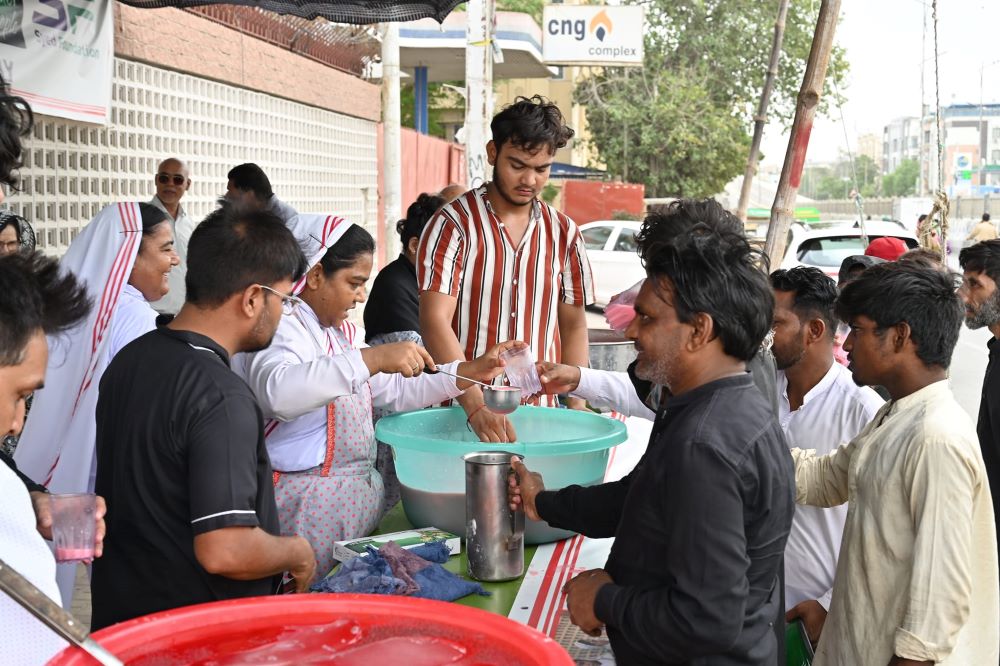
Franciscan Missionaries of Christ the King distribute sharbet (a popular South Asian beverage) on July 12, the fifth of Muharram, at a stall outside Dar-ul-Sukun Centre in Karachi. The sisters run the center. (Courtesy of Kashif Anthony)
Moiz Mansoor, the assistant security and public relations officer of the Dawoodi Bohra community, thanked the nuns for facilitating their females.
"This new experience had a wonderful impact on our community members," he said. "Our females enjoyed great company with nuns. It was an honor for us; we felt very special."





